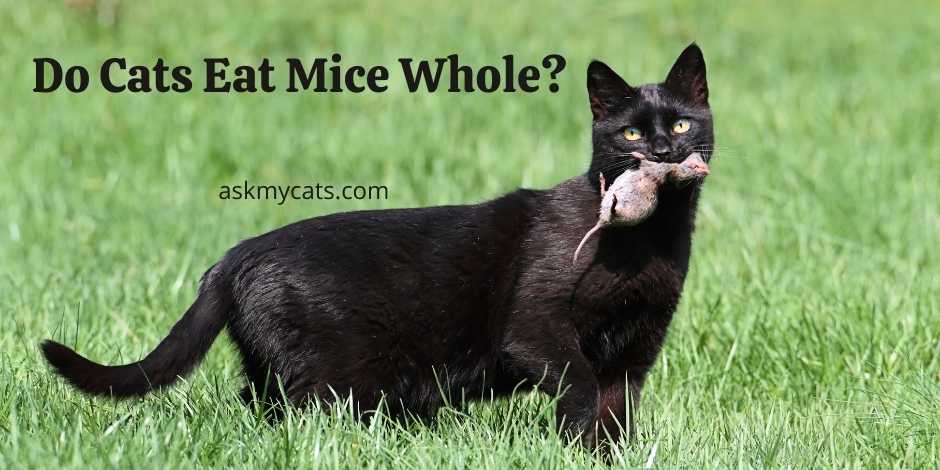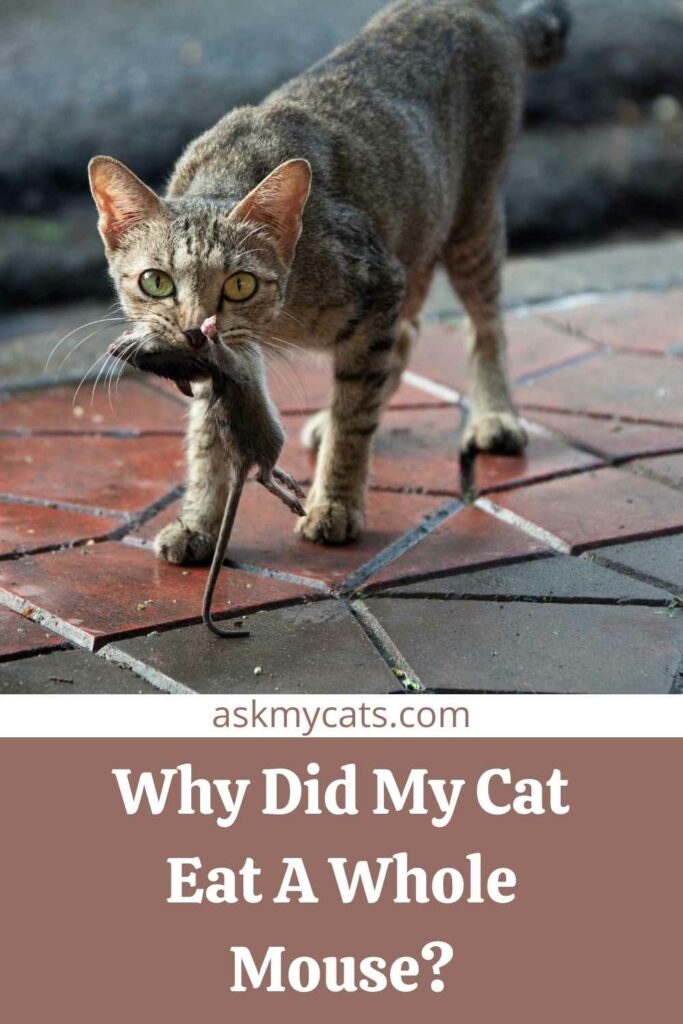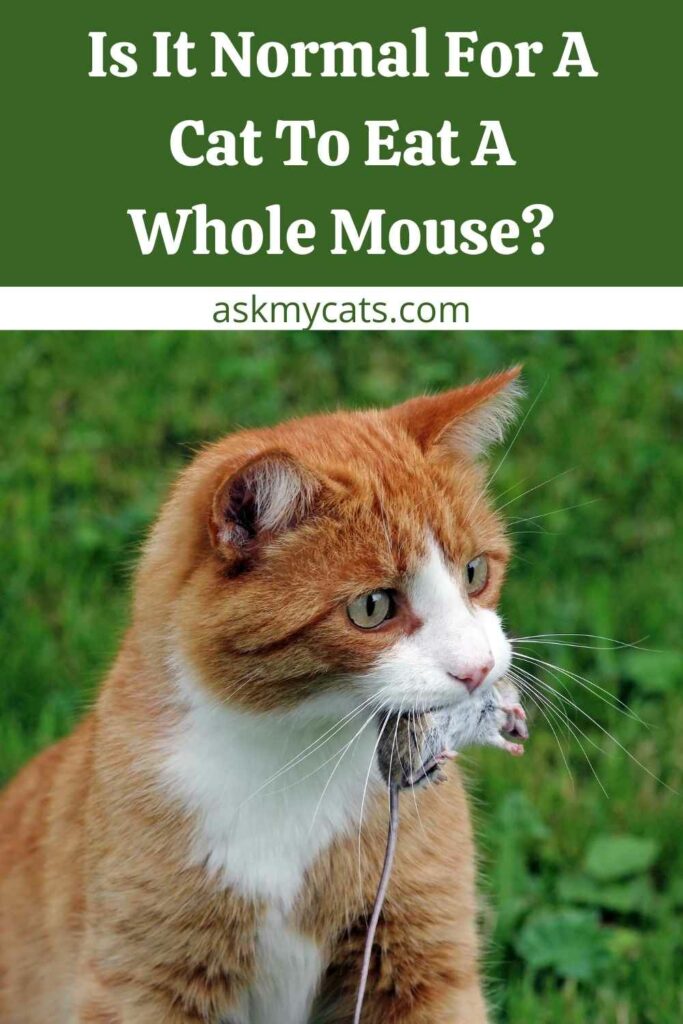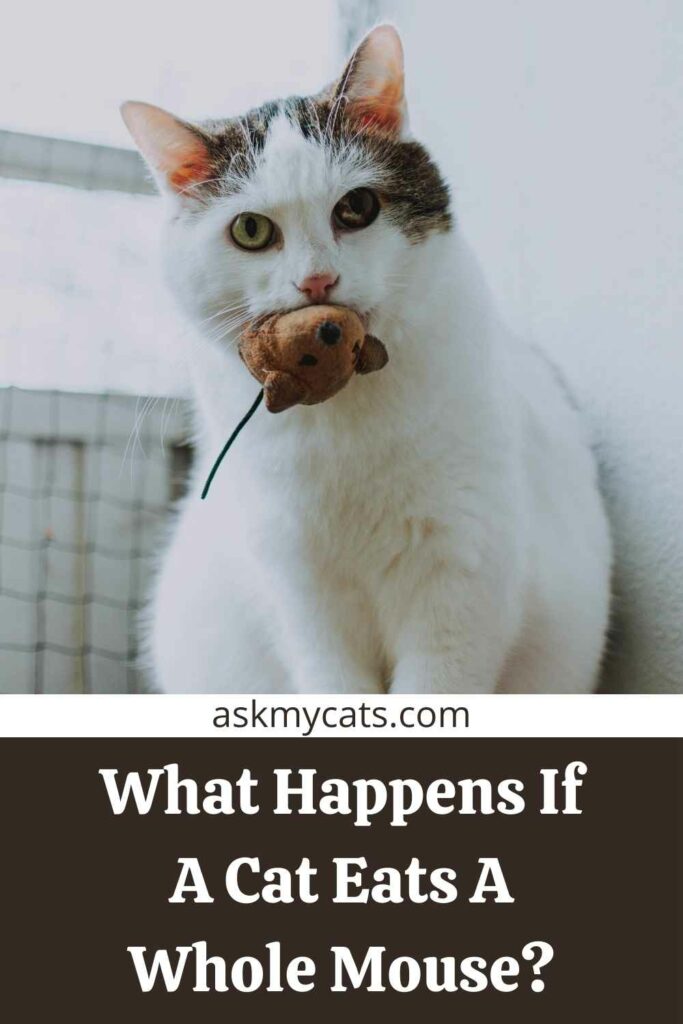Cats have an instinct to hunt mice. Whether indoors or out, Cats will quickly hunt out mice and other small creatures, just like they would in the wild. It’s just a part of who they are and something that comes easily to them.
However, you might question if cats eat mice whole after they capture them.
Cats can eat mice whole, but most prefer to consume them in pieces. This involves putting aside sections of the body they don’t like to eat, such as the stomach and/or spleen.
Suppose you’ve caught your cat eating mice. In that case, you’re probably wondering if it’s safe, if cats eat mice whole, and if you should be concerned about discovering carcasses scattered around.
If you wonder if cats eat their prey like mice whole or not, read on for some surprising discoveries.


Give Your Cat the Perfect Day
Get the Free Ebook!
Why Did My Cat Eat A Whole Mouse?
Your cat ate a whole mouse because he enjoys eating it.

Cats prefer to eat mice’s heads because it is the most accessible section of the body to swallow. The head is a treat for cats because it has the eyes that they are drawn to. It’s also a lot of fun to chew on.
They generally go for the eyes or face when they attack and consume it, precisely like other predatory creatures.
Cats are predators by nature. They will always have the desire to hunt, even if they have been tamed. Birds and mice are their preferred prey, although they may also hunt other live species such as snakes and rabbits.
It is entirely dependent on the cat. Cats have distinct personalities, and their feeding habits differ from one to the next. Depending on the size of the mouse, some cats will eat them whole.
Other cats will swallow the entire mouse except for the tail, which they will sever with a single snap of their teeth. Others will consume the mouse whole but will discard the stomach and spleen.
Nonetheless, some cat owners report that their cat will only eat the head or the body and tail. Other cats will decapitate the mouse but just eat a limb or two, not the whole thing.
If another cat threatens to take the mouse from them, some cats will only eat it whole. Others will eat mouse guts for a time but refuse to eat the gizzard because of its acidic flavor.
Feral, stray, and outdoor cats are less likely to consume mice than house cats or tamed cats. House cats are more likely to hunt and play with mice than kill and devour them.
Cats will hunt and kill mice, but they may not always eat them whole because they are trying to teach you how to hunt for food as their mama cats did. It’s also possible that they’re pursuing a mouse, and the game has become too harsh.
Other cats will hunt and kill in order to bring it to their people as a gift. Mice are hunted and killed by particular cats, but they are not eaten unless they are starving. Other cats will capture mice but have no idea what to do with them to leave them about the house.
Is It Normal For A Cat To Eat A Whole Mouse?
It’s normal for cats to eat mice whole regularly and do so often in the wild. This permits the cat to consume its prey swiftly and safely while avoiding predators.

Cats can eat a whole mouse, but only on rare occasions. Eating mice regularly is not recommended or encouraged since mice can carry roundworms, which can be passed to your cat. They also carry toxoplasma gondii, the cause of the infectious illness toxoplasmosis.
Cats are (usually) programmed to capture mice. Mice are easy to catch, are high in protein and taurine, and are numerous, making them ideal prey for cats.
When a cat captures a mouse, it will typically kill it and eat it whole (except the gizzard and guts). Still, cats may occasionally leave dead mice for you as a present. Cats that eat mice like to consume complete mice; otherwise, they would not bother.
Of course, this behavior is influenced by various circumstances, including the environment. Suppose your cat is entirely domesticated and never learned how to capture mice from its mother.
In that case, your cat may be less interested in eating mice and, at most, use them as play. This can result in you discovering whole dead mice lying about and a happy cat eating its regular cat chow.
It’s improbable that cats despise entire mice; instead, it’s more likely that they’ve never learned to hunt them or don’t see the point in eating them. Some cats are just uninterested in being disturbed.
What Happens If A Cat Eats A Whole Mouse?
Cats can choke from eating a whole mouse.

A bone trapped in the mouth or throat of a cat eating a mouse too quickly can cause a lot of harm, including choking. Call your veterinarian immediately if you notice your cat drooling excessively, bleeding from the lips, having trouble breathing, or otherwise acting strangely.
Cats who consume poisoned mice may develop secondary poisoning. It’s not frequent, and the risk decreases the more prolonged the mouse has been poisoned, but it’s still something to watch out for.
Contact your veterinarian if you detect symptoms like vomiting, lethargy, diarrhea, muscular spasms, or other unusual behaviors.
Although eating entire mice is unlikely to harm most cats, consult your veterinarian if you notice anything strange about your cat’s behavior or health.
Suppose your cat has been hunting wild mice, in particular. In that case, you have no idea what else has been taken up accidentally by his eating.
Although indoor cats are less likely to catch mice than outdoor cats, it is possible. Because your feline pal is predisposed to hunting, they will occasionally attack odd items such as wads of paper or your feet.
It’s conceivable that your cat will get sick after eating a mouse.
According to the Animal Medical Centre, mice can be infected with roundworms, which they can subsequently pass on to your cat.
Mice can also contain the toxoplasmosis parasite, which can be transmitted to cats and ultimately to people via cat feces.
Cats and mice may never get along, but you can help by keeping your cat indoors, providing them with toys, and engaging them in playful activities. And if your cat does catch a mouse, it’s always a good idea to get them examined by a veterinarian.
Can A Cat Digest A Whole Mouse?
Yes, cats can digest a whole mouse, depending on the size of the mouse.
Because they’ve never been educated, many indoor cats would cheerfully capture the mouse but have no idea what to do with it. They’ll then bring it to you (alive or dead) to deal with and brag about catching it.
Even outdoor cats may refuse to eat a mouse if they are not hungry, and they are unlikely to consume a mouse if they are frequently feeding at home.
Older cats may not hunt and devour mice as readily as younger cats, depending on their overall health. Mice are less complicated to catch than birds, but they still require quickness and agility.
If your cat spends all of its time indoors, it’s doubtful that it’ll be engaging in eating entire mice (or any part of the mouse, for that matter).
Do Cats Eat The Bones Of Mice?
When a cat eats a whole mouse, the bones are consumed.
Wild cats are solitary creatures. As a result, they hunt and kill tiny prey like mice and rats, and other rodents. Squirrels, rabbits, reptiles, amphibians, birds, insects, and tiny fish are among the animals they can hunt.
It will be simpler for them to include the bones if they have these tiny creatures on their list.
The teeth of a cat may shatter the bones of tiny creatures. As a result, they won’t have to be concerned and may chew to their hearts’ content.
Furthermore, it is well known that bones can positively impact cats. They may train and strengthen their teeth by eating tiny pieces of meat with small bones.
As a result, mice’s tiny bones will not be an issue for them. Furthermore, if they puke up the tiny bones, it would be quite a problem.
Do Cats Like The Taste Of Mice?
Yes, cats like the taste of mice.
While cats can consume a whole mouse, they occasionally throw away other bits. The tail and the stomach are these sections.
Cats discard the mouse’s stomach due to its unpleasant taste. Because a mouse’s tail is spiky, rough, and chewy, cats avoid it. When cats are full, they become choosy, and when they are hungry, they devour everything.
The head is the most popular mouse component among cats. Even if they aren’t hungry, cats will devour the head right away. Not every cat will eat a mouse.
House cats will play with mice or hunt them down, but feral cats will devour them. Although all cats can hunt mice, several breeds excel at it.
Why Do Cats Leave Parts Of Mice?
Cats leave some parts of the mice because they don’t like it.
There will be two parts that they will most likely discard. These are the stomach and the tail. Cats often discard the stomach due to its unpleasant taste.
The stomach has the most revolting flavor compared to the rest of a mouse’s body. The stomach contains many acids, which is why a cat won’t eat it.
While a mouse’s stomach is not as acidic as ours, it is nonetheless exceedingly acidic. If fed, the pH of a mouse or rat’s stomach varies from 3 to 3.2; if not, it ranges from 3.9 to 4.0.
In addition, the intestines are located in the stomach. While they are edible for cats, they are frequently avoided owing to their unpleasant taste.
Finally, for some reason, cats dislike organs. As a result, they would pass for it because it is positioned on the stomach.
Cats may eat the tails of mice, although they appear to be spikes that are generally rather lengthy. Furthermore, any cat’s tail can be relatively firm and chewy. As a result, if cats are in the mood to be choosy, they will pass on this.
How Many Mice Do Cats Eat In A Day?
The average feral will consume nine mice per day, with a few unsuccessful hunts thrown in for good measure.
If left to their ways, Cats would eat multiple little meals throughout the day instead of the one to three meals that their domesticated counterparts consume. This quantity of mice provides the protein, taurine, and energy that cats require to maintain their lifestyle.
If your cat stays strictly indoors, it is unlikely to consume mice. Instead, it may bring you the mouse to kill or present you with a dead one, but it will not eat it.
Frequently Asked Questions
Why Do Cats Leave Mice Guts?
The stomach pH of mice was 3.0 (fed) and 4.0 (fasted), while rat stomach pH was 3.2 (fed) and 3.9 (fasted) (fasted). Because the intestines of a mouse are acidic, cats will not eat them.
Why do cats bring you alive animals?
Cats were created to hunt. This implies that if a cat gives you an alive or dead animal, they consider you a member of their family. Their instincts tell them that they must do this to live and that they must pass on these vital, life-saving talents to their family.
Is it bad if my cat kills a mouse?
Unless the mouse ate poison before being caught, it isn’t particular. However, because the cat killed the mouse and did not eat it, everything should be alright. A vet visit is likely necessary if he demonstrates any unusual behavior.
Final Words
Cats are natural hunters, and they will go for mice and other rodents. Each cat is distinct, which is mirrored in how they consume their prey. Some cats eat mice whole, while others only eat the heads, and yet others simply decapitate them and leave them to die.
Drop your queries in the comments section below.
Also, check out Are Female Cats Better Hunters Than Male Cats?

Cats may get roundworms from the environment, but the main concern for cats eating rodents are tapeworms. Rodents are intermediate hosts for tapeworms, and encyst in their muscles. Then when cats (or dogs) eat them, they mature in the cat who then will start passing tapeworm segments in their stool. Pets do not get tapeworms from eating these segments. The segments look like rice, and so, the intermediate hosts (rodents) eat them and the cycle starts again.
p.s. Another type of tapeworm has fleas as an intermediate host, and infect pets when they ingest an infected flea (licking, grooming, etc.)
Hey there!
Thanks for sharing that information about cats and tapeworms. It’s always great to learn more about our furry friends and how to take good care of them.
You’re absolutely right that cats can get roundworms from the environment, but tapeworms are a major concern when it comes to cats eating rodents. It’s fascinating (and a bit gross!) to know that rodents can be intermediate hosts for tapeworms, and how the whole cycle works. I’ll definitely keep an eye out for those rice-like tapeworm segments in my cat’s stool and make sure they get the proper treatment if needed.
And you’re spot on about the other type of tapeworm with fleas as an intermediate host. It’s essential to be aware of this so we can protect our pets from potential infections.
Thanks again for sharing your knowledge! It’s always nice to learn something new and useful about our furry companions. If you have any more tips or insights, feel free to share them with me.
Take care and have a purrfect day! 😺